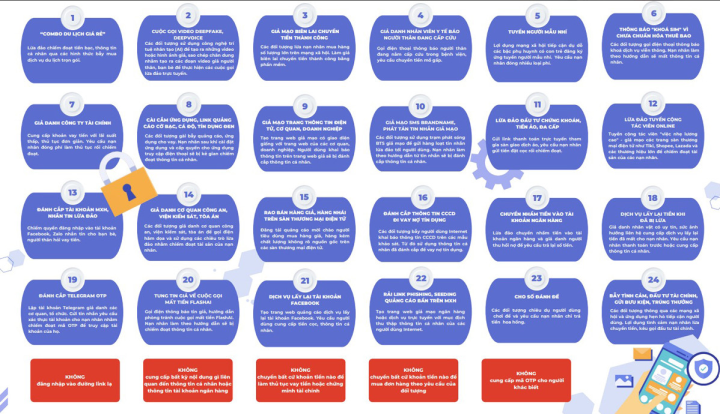Online fraud has "blossomed" recently thanks to its simplicity and effectiveness in obtaining personal information and accounts of victims. To avoid "prey" suspicion and increase the level of success, cybercriminals often change their scenarios and tactics to approach step by step.
Statistics show that some common forms in Vietnam include fraud via social networks, via text messages/phone calls/emails, and recruitment fraud (recruiting collaborators, part-time work).
According to the Department of Information Security (Ministry of Information and Communications), there are 3 main fraud groups (brand counterfeiting, account hijacking and other combined forms) with 24 forms of fraud taking place in cyberspace in Vietnam, targeting the following groups of people: the elderly with 15 regular forms of fraud; 3 forms of luring children online; 13 forms of fraud against students and young people; workers, laborers, and office workers are lured with 19 forms of fraud.
In the first 6 months of 2023, online fraud in Vietnam increased by 64.78% over the same period last year and increased by 37.82% compared to the last 6 months of 2022.

24 common forms of online fraud in Vietnam today
Financially Targeted Scenario
Cybercriminals also follow trends, says Adrian Hia, Managing Director of Kaspersky Asia Pacific. " They know which latest themes work best. Social engineering plays on the human mind, which is why it's hard to stop yourself from clicking on a link that could end up being malicious ." In 2022, the main phishing themes tracked by experts are related to compensation, bonuses, and even refunds.
Among them, the “Big Bank Ad Campaign” is a popular lure in 2022. Visitors to a fraudulent website are offered a one-time payment or a fee to complete a service quality survey. After banks, FinTechs (financial technology companies) are starting to become targets of impersonators for profit.
According to security experts, the situation of impersonating financial technology organizations to commit fraud is happening more and more frequently and sophisticatedly. "Interest rate of 30-40%", "Earn money while sleeping", "Easy loan without paperwork"... are "winged" advertisements under the guise of easy work with high salary to cover up the trap set for those who want to invest for short-term profit.
Even the scammers use logos (symbols), create their own websites and applications that are identical to the impersonated businesses, making it very difficult for users to distinguish. According to the representative of 3Gang Joint Stock Company (a fintech application that allows users to start saving from 30,000 VND), many bad guys have impersonated company employees to call on people to buy insurance and borrow money at high interest rates.
As a result, there are cases of transferring up to several hundred million dong following the other party's instructions. When the scammer disappears, they find a new business or they are scammed.

Users should be careful and check information carefully when installing and using applications from the Internet to avoid fake software.
The business representative said that, first of all, people need to raise awareness and be vigilant with strange contacts on social networks, should have a multi-dimensional view, selectively accept and be cautious with advertisements that entice people to borrow money and get rich suddenly. " After receiving the information, it is necessary to verify it. Users can look it up on the App Store or CH Play, if the application they are looking for appears on both app stores, with the correct developer name, then they can use it ," this person advised.
Fraud Trends 2023
The post-COVID-19 crisis period has created conditions for crime to flourish, including online. Kaspersky experts predict that scams promising compensation and payments from government agencies, large corporations and banks will likely remain popular among cybercriminals for some time to come.
The “unpredictable” nature of the currency market and the exit of individual companies from the market will likely impact the number of online shopping-related scams. The COVID-19 theme, which was popular with cybercriminals in 2020 and 2021, will fade in 2022 and be replaced by more pressing global issues.
In addition, experts have also seen an increase in targeted phishing attacks, where the attackers do not immediately move to the main activity but through some active contact with the victim. This trend is likely to continue and new tricks are also likely to appear with attacks that generate significant profits for the perpetrators.
Khanh Linh
Source






![[Photo] Prime Minister Pham Minh Chinh and Brazilian President Luiz Inácio Lula da Silva attend the Vietnam-Brazil Economic Forum](https://vstatic.vietnam.vn/vietnam/resource/IMAGE/2025/3/29/f3fd11b0421949878011a8f5da318635)























![[Photo] Brazilian President visits Vietnam Military History Museum](https://vstatic.vietnam.vn/vietnam/resource/IMAGE/2025/3/29/723eb19195014084bcdfa365be166928)




























































Comment (0)